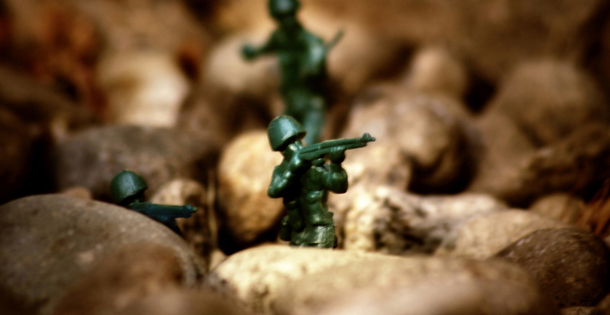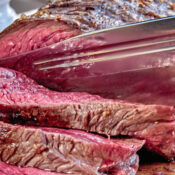It was the winter of the Desert Storm trading cards, and most of the kids on my block had already caught the patriotic fever that came hand in hand with smart bombs, brown camouflage pants, and posters of A-10 Warthogs. I’m sure wars have had trading cards before, but it wasn’t every day you could trade a Ricky Henderson or an Ozzie Guillen for a General Schwarzkopf or a Carpet Bombing. In a way, rooting for the Army was like being invested in a local sports team, except it wasn’t one that lost all the time, like the Indians or the Cavs or the Browns. In retrospect, that was probably the reason why jingoistic fervor and basement militaria were so exceedingly common in our particular corner of the Midwest.
Despite a pacifistic upbringing, I had to admit that there was something strangely appealing about the artifacts of war; the guns and bayonets and shrapnel-torn helmets. Of course, there was nothing of the sort in my house, save for shelves of history books, so it felt even more seductively verboten. It wasn’t strange to find yourself in a friend’s wood-paneled basement, suddenly beholding an AK-47 or a dud grenade or a cabinet of Hitler Youth knives.
My best friend and next-door neighbor Scottie Barber didn’t have any war paraphernalia in his home either, but we both harbored an obsession with warplanes and military history, particularly in regard to the Second World War. On Saturday afternoons, Scottie and I would often play with legions of toy soldiers made from cheap-smelling plastic. He had a box of his own, and I’d lug mine over, too — together, we made a tidy little army. By virtue of what we had, the two sides of the conflict were little green men meant to represent the United States in the Second World War, and little gray men meant to represent Germany in the First World War. We always pretended they were actually Nazis, but the spiked Pickelhaube helmets were unmistakable. It confuses me to this day why forces of the toy Kaiser were so easily obtainable in Midwestern dollar stores in the early 1990s, but some mysteries are probably best left unsolved.
Most of the play was dedicated to an extremely elaborate set-up period, whereupon Scottie’s bedroom was slowly transformed into a battlefield with each little man positioned meticulously along the frontlines. There were men with bazookas, flamethrowers, and sub-machine guns. There were officers packing pistols and men with grenades, frozen mid-hurl. There were men with Browning machine guns, men loading mortars, and men crawling on their bellies. And of course there were the least attractive figures (those without weapons, I mean), like the minesweepers, the men with binoculars, and the radio operators. There was an astounding prevalence of these figures, just as there are always way too many green and yellow jelly beans.
Some kids would play with their men outside (ideally in a sandbox, so as to disguise their unsightly plastic bases), but Scottie and I always kept our soldiering indoors, even in the summer. This was because of our neighbor, Mr. Kostakopoulos, who had lived under the Nazi occupation in Greece and had seen many terrible things. He became incredibly agitated whenever anyone made light of war, and especially toward children who played at it. It was rumored that he had once destroyed a television set because it was showing an episode of Hogan’s Heroes. We shuddered to think of what he might do, as a matter of principle, to a pack of Desert Storm trading cards.
Mr. Kostakopoulos generally kept to himself, but the consensus was that he was deranged and probably dangerous, so the neighborhood kids were told by their parents to avoid him at all costs. Of course, an exception was made at Halloween, so that the parents of trick-or-treaters could partake in his delicious homemade baklava.
As it turned out, the preparations for our wars were always more entertaining than actually fighting them. By the time everything was set up, the afternoon was half gone. We’d shoot a few rubber bands back and forth, trying to knock over the enemy men, but then we’d lose steam, pretend an air strike had been called in, and obliterate the Nazis like the men wearing the rubber costumes in a Godzilla movie.
On this particular Saturday, we leaned back in beanbag chairs, surveying the carnage and sipping from orange-flavored Little Hugs. A Little Hug was a kind of sugar water encased in a plastic, barrel-shaped mold. The barrel’s lid was made from tin foil, and the idea was to puncture it with a straw. Instead, we punctured them with our front teeth and marveled at the result, which resembled the handiwork of buck-toothed vampires.
“How many gees do you think you could take before blacking out?” asked Scottie, apropos of nothing. “Gees” referred to g-force, the heightened power of gravity endured by fighter jet pilots as they execute difficult maneuvers.
“I don’t know,” I said. “Maybe five or six.”
“I know I could take nine, maybe ten,” bragged Scottie, knowing full well that even seasoned fighter pilots had been known to black out at seven. There was a friendly one-upmanship at play during most, if not all, of our interactions.
“Oh jeez, I forgot to tell you …” Scottie said.
“What?” I asked.
“You’re not gonna believe this, it’s so gross.”
“What!”
“I saw the grossest picture in a World War II book.”
“What was it?” I asked, intrigued. We understood that war was horrific on some level, but like most children who had never actually experienced one, we were short-sighted and fascinated by morbidity.
“It was a Japanese soldier on Tarawa. The Marines were clearing out the bunkers with flamethrowers, and they barbequed him.”
“What did it look like?”
“He was mostly a skeleton, ’cause he’d been burned completely, but his helmet was still on. It was like the skeleton was alive.”
Some weeks later, Scottie showed me this picture, buried inside a thick volume on the island-hopping campaigns of ’43 and ’44. It was horrible, just as Scottie had described. A detail he had omitted was that a few random patches of flesh remained attached to the skull, lending it a freakishly lifelike appearance. When you’re 7 years old and you see something like that, it makes an impression. I can still see his charred skull in my mind’s eye.
“I’ve seen worse than that,” I said, wanting to raise the stakes.
“Like what,” said Scottie.
“I’ve seen dead kids, in piles. From the Holocaust.”
“That’s nothing, I’ve seen that.”
“It wasn’t a picture,” I lied, “it was a movie of them getting killed.”
“No way,” said Scottie. “That’s impossible.” Scottie was right. He knew that my parents would never allow me to see such a film.
“Uh … it was a flip book.”
“A Holocaust flip book?”
“Yeah.”
“You’re lying.”
“It wasn’t just a flip book, it was a regular book with little flip book pictures in the corners of the pages.”
“Then show me, next time we’re at the library.”
“Okay,” I said, hoping he’d forget.
“I won’t forget.”
“Neither will I,” I said, forcing a smile. Why am I such an idiot? I wondered.
Later that day, we were in Scottie’s dining room, dive bombing some little gray men with a plastic model of a P-47 Thunderbolt. The P-47 was our favorite warplane of the moment: We admired its versatility, its toughness, and its simple, robust aesthetic. I imagine that when people encounter warplanes in real life, they tend not to spend so much time admiring their beauty. Thankfully, Scottie and I had the benefit of not being bombarded with metal and chemicals from a great height.
“I wonder if America’s the only country that never lost a war,” Scottie wondered.
“There might be others,” I said. “But I can’t think of any.”
“Well, let’s go through the major powers. England lost to us in the Revolution, France lost to the Nazis …”
“Russia lost to the Japanese, the Japanese lost to us,” I continued. “What about China?”
“China lost to the Japanese before we beat them.”
“I guess that’s true,” I said.
“Then we beat Mexico, Spain, the Indians …”
“What about Canada?”
“Canada lost in the French and Indian war.”
“But was it ‘Canada’ then?”
“Sure it was.”
“What about the countries that stay out of war, like Switzerland?”
“They don’t count. You have to play to win.”
“Then maybe you’re right,” I said.
We were interrupted by an outburst of laughter from the living room. It was Mr. Barber, who was lounging in an armchair and watching the Cavaliers lose. Mr. Barber was a veteran of Vietnam, but I’d never heard him talk about it.
“What’s so funny, Dad?” asked Scottie.
“You kids are. ‘We never lost a war,’ who told you that?”
“Books,” said Scottie.
“Well, the books were wrong. We lost Vietnam.”
“But way more of them died than us,” Scottie reasoned.
“Civilians, maybe,” said Mr. Barber, and left it at that.
“Vietnam was more of a tie, then,” Scottie said. I think he was attempting to salvage some of his father’s honor. Nobody wanted a dad who was on the losing side.
“Korea was a tie,” Mr. Barber explained. “Vietnam was in the loss column. A solid L.” He took a sip from his can of Rolling Rock.
“But if the Viet Cong won, how come they … well, anyway, they didn’t have much of a country left after.”
“Nobody really wins a war …” explained Mr. Barber, without taking his eyes off of the game. “There’s only different degrees of losing. So maybe we lost less, but we still lost. Aw, come on, Hot Rod, you can at least try to make your free throws.”
“We had B-52s, though,” Scottie moaned. “That’s the best non-stealth bomber in history.”
“Yeah,” I said. “They’ve been in service over thirty years. There’s some flying in Desert Storm, right now.”
“This is so stupid,” said Mr. Barber, gesturing at the television. “How do you miss that shot? He was in the paint for Christ’s sake! If Lenny doesn’t put Price back in there, I’m gonna … Christ …” He trailed off, taking another sip of beer.
“We won the Cold War, though,” muttered Scottie. “That was one I forgot. Even with a loss, we’re still batting, like .900, .950. Nobody can beat that.”
“Yeah, that’s pretty good,” I said.
“Losing to the Bucks, to the damn Bucks …” Mr. Barber melodramatically lowered his chin to his chest. “Hey, Scottie, you mind grabbing your old man another beer?”
“Sure, Dad,” said Scottie, and he left the room.
I sat there for a minute, lost in my own world. Evening light streamed into the living room from between the curtains, and I held the P-47 aloft, turning it until the sun glittered across the fuselage, just the way I wanted it to. The game continued, ambiently, in the background. The players ran back and forth and forth and back.
Become a Saturday Evening Post member and enjoy unlimited access. Subscribe now



